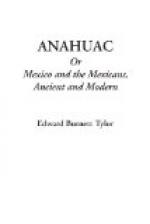I think this body of soldierless officers is one of the most troublesome political elements at work in the Republic. The political agitators are mostly among them; and it is they, more than any other class, who are continually stirring up factions and making pronunciamientos (what a pleasant thing it is that we have never had to make an English word for “pronunciamiento"). Several times, efforts have been made to reduce the Army List to decent proportions, but a fresh crop always springs up.
In the “lowest depth” of mismanagement to which Mexican military affairs have sunk, the newspapers still triumphantly refer to countries which surpass them in this respect, and, at the time of our arrival, were citing the statistics of the Peruvian Republic, where there are a general and twenty officers to every sixty soldiers, and as many naval officers as seamen.
These officers are not subject to the civil administration at all, whatever they may do. They have their fuero, their private charter, and are only amenable to their own tribunals, just as the clergy are to theirs. To the ill effects of the presence of such armies and such officers in the country, we must add the continual interruptions to commerce arising from the distracted state of the republic, and the uncertain tenure by which every one holds his property, not to say his life; and this, in its effect on the morale of the whole country, is worse than the positive suffering they inflict. So much for soldiering, for the present. We leave the President trying, with the aid of his Congress, to organize the government, and set things straight generally. This August assembly is selected from the people by universal suffrage, in the most approved manner, and ought to be a very important and useful body, but unfortunately can do nothing but talk and issue decrees, which no one else cares about.
In consequence of the alarming increase of highway-robbery, steps are taken to diminish the evil. It is made lawful to punish such offenders on the spot, by Lynch law. This is all. You may do justice on him when caught, but really you must catch him yourself. Sober citizens are even regretting the days of Santa Ana (recollect, I speak now of 1856, and they might regret him still more in 1860.) He was a great scoundrel, it is true; but he sent down detachments of soldiery to where the robbers practised their profession, and garotted them in pairs, till the roads were as safe as ours are in England. A President who sells states and pockets the money may have even that forgiven him in consideration of roads kept free from robbers, and some attempt at an effectual police. There is a lesson in this for Mexican rulers.
The Congress professed to be hard at work cleaning out the Augean stable of laws, rescripts, and proclamations, and making a working constitution. We went to see them one day, and heard talking going on, but it all came to nothing. Of one thing we may be quite sure, that if this unlucky country ever does get set straight, it will not be done by a Mexican Congress sitting and cackling over it.




